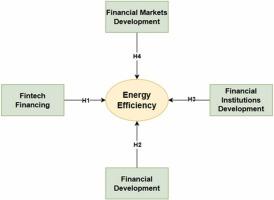Harnessing FinTech for green growth: financial innovations and energy efficiency in OECD nations
IF 6.9
2区 经济学
Q1 BUSINESS, FINANCE
Research in International Business and Finance
Pub Date : 2025-07-01
DOI:10.1016/j.ribaf.2025.103062
引用次数: 0
Abstract
We investigate the influence of FinTech startup financing on energy efficiency in 32 OECD countries from 2010 to 2022, considering the roles of financial development, financial institutions, and financial markets. Using a comprehensive dataset, we apply Data Envelopment Analysis (DEA) with a Super Slack-Based Measure (Super-SBM) to calculate energy efficiency scores, along with econometric techniques to ensure robustness and explore non-linear effects. Our findings demonstrate that FinTech financing significantly enhances energy efficiency, particularly in countries with more advanced financial systems. Additionally, financial development through well-established institutions and markets plays a crucial role in promoting energy efficiency, with the effects being stronger in highly developed countries. The quantile analysis further reveals that these impacts are asymmetric, with stronger effects observed in countries that already have higher levels of energy efficiency. These results suggest that while FinTech and financial development contribute positively to energy efficiency, their influence varies across different country contexts. Policymakers should focus on strengthening financial systems in less-developed nations to fully capitalize on FinTech innovations for improving sustainability.

利用金融科技促进绿色增长:经合组织国家的金融创新和能源效率
本文研究了2010年至2022年32个经合组织国家金融科技创业融资对能源效率的影响,考虑了金融发展、金融机构和金融市场的作用。利用一个全面的数据集,我们应用数据包络分析(DEA)和超级松弛测度(Super- sbm)来计算能源效率得分,以及计量经济学技术来确保鲁棒性和探索非线性效应。我们的研究结果表明,金融科技融资显著提高了能源效率,特别是在金融体系较为发达的国家。此外,通过完善的机构和市场进行金融发展,在促进能源效率方面发挥着至关重要的作用,在高度发达的国家效果更强。分位数分析进一步表明,这些影响是不对称的,在已经具有较高能源效率的国家观察到的影响更强。这些结果表明,虽然金融科技和金融发展对能源效率有积极贡献,但其影响因国家而异。政策制定者应注重加强欠发达国家的金融体系,充分利用金融科技创新,提高可持续性。
本文章由计算机程序翻译,如有差异,请以英文原文为准。
求助全文
约1分钟内获得全文
求助全文
来源期刊

Research in International Business and Finance
BUSINESS, FINANCE-
CiteScore
11.20
自引率
9.20%
发文量
240
期刊介绍:
Research in International Business and Finance (RIBAF) seeks to consolidate its position as a premier scholarly vehicle of academic finance. The Journal publishes high quality, insightful, well-written papers that explore current and new issues in international finance. Papers that foster dialogue, innovation, and intellectual risk-taking in financial studies; as well as shed light on the interaction between finance and broader societal concerns are particularly appreciated. The Journal welcomes submissions that seek to expand the boundaries of academic finance and otherwise challenge the discipline. Papers studying finance using a variety of methodologies; as well as interdisciplinary studies will be considered for publication. Papers that examine topical issues using extensive international data sets are welcome. Single-country studies can also be considered for publication provided that they develop novel methodological and theoretical approaches or fall within the Journal''s priority themes. It is especially important that single-country studies communicate to the reader why the particular chosen country is especially relevant to the issue being investigated. [...] The scope of topics that are most interesting to RIBAF readers include the following: -Financial markets and institutions -Financial practices and sustainability -The impact of national culture on finance -The impact of formal and informal institutions on finance -Privatizations, public financing, and nonprofit issues in finance -Interdisciplinary financial studies -Finance and international development -International financial crises and regulation -Financialization studies -International financial integration and architecture -Behavioral aspects in finance -Consumer finance -Methodologies and conceptualization issues related to finance
 求助内容:
求助内容: 应助结果提醒方式:
应助结果提醒方式:


